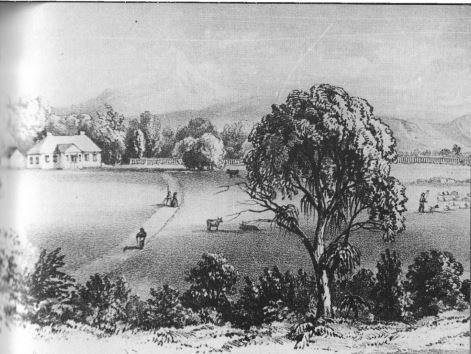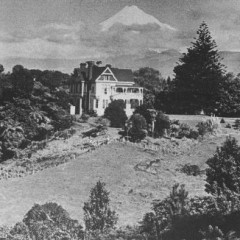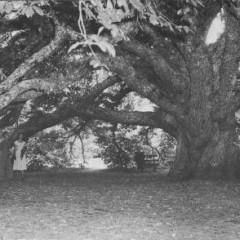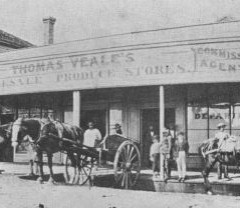3:2
He was a son of Thomas King who had arrived in the William Bryan in 1841 and who set up business as a general trader before taking a farm at Mangorei. During the hostilities he took a house at the corner of Powderham and Dawson Streets. After the fighting he was appointed the first manager of the Bank of New Zealand and his son, Harry King, took over the farm. The only formal education Newton King received was at the school conducted by William Crompton and when he was 16 he became a clerk for Webster Bros, merchants, ship owners and agents, where his business acumen and inherent knowledge of farming soon became apparent. For a short time he entered partnership with Robert Beauchamp, accountant and commission agent, and in 1879 he set up his own business as Auctioneer and Commission agent with a staff of one boy, Stanley Shaw, with whom he had worked at Beauchamps. Thus, was a remarkable business formed. For 100 years the name Newton King has been closely associated with the development and co-operation between town and country.
He realised that only by the advancement of land settlement could Taranaki and the new firm flourish. The 'hungry eighties' had begun and for many settlers and their families the term was no mere figure of speech. They needed stock, fencing, seed, fertiliser, and an outlet for their produce; above all, they needed supplies for themselves while they were transforming forests into farms. Newton King was one of the few men they could turn to. He established saleyards at Waiwakaiho, (which were demolished in the late 1960s to make way for industrial development), where he conducted livestock sales; he established agencies in the commodities settlers needed, sold the goods on long-term credit, and advanced money to many farmers. Finance was always a problem in those early years, but gradually produce from the land began to reach the firms in the town, of which Newton King's was the most forward-looking, for disposal. Grass seed, mainly cocksfoot, was one of the most profitable crops; fungus, for export to China, was another. But dairying was also developing fast.
The first co-operative dairy company in Taranaki was formed by a group of Opunake settlers in 1885, but it was not a great success, and 18 months later it was taken over by the Crown Dairy Company formed by Newton King, J. G. George and R. Cock. By now Newton King was becoming an influential and wealthy man, and when the Brooklands estate (now part of the lovely Pukekura Park complex) came on the market he bought half of its 80ha at $52 a hectare. Few of the hundreds of thousands of city people and tourist who have visited the Bowl of Brooklands and the park in the last 50 years realise fully the links this beautiful area has with the past.
The first selection of suburban and rural lands in New Plymouth was made by a ballot system in June 1842. Captain Henry King, RN, who had arrived in the Amelia Thompson as Chief Commissioner for the Plymouth Company* was, by virtue of his position, given a choice before the ballot was taken. He selected, in addition to a town section, two 20 ha sections adjoining 'arrington's town belt, and later acquired 40 more adjoining hectares. Almost in the centre of this area was a Maori clearing, where the captain built his house. The family occupied it on March 29, 1843. In that year E. J. Wakefield+ visited New Plymouth. He wrote: 'I found them (the colonists) hard at work ... hardly a complaint to make and spending homely English evenings round a huge farmhouse chimney .' He does not specify any particular building, but it is generally accepted that he was referring to Captain King's home. The building was 'long and low', shaped like an inverted letter L, with the chimney at the right-angled corner.
The home was abandoned during the land wars and on August 11, 1860, the Taranaki Herald reported a large body of natives broke into Captain King's house at Brooklands and destroyed everything it contained .On March 15, 1861, the Herald said: 'Between 5 and 6 o'clock this morning dense masses of black smoke gave notice that Brooklands with outbuildings, barns, stabling, etc., was given to the Hames. Not a vestige remains except the masonry of the chimneys.' Captain King (no relation to Newton King) farmed Brooklands in partnership with his brother-in-law, George Cutfield, formerly a naval architect in Portsmouth, until King's death in 1874.
Ten years later half the property was sold to Newton King by the trustees of the Cutfield Estate. Richard Cock, later to be mayor of the town, bought the other half. Newton King was 28 when he married Ngaire, a daughter of Dr eorge St George, and shortly afterwards the 'new' Brooklands h me stead was built. Meanwhile Newton King was expanding his activities. He opened branches of business in many parts of the province regular auction sales were conducted at Stony River, Rahotu, Waitara, Urenui, Awakino, Mokau, Douglas, Ohura and Whangamomona. He imported stocks of practically everything required by farmers, from fencing staples to the latest in mechanical equipment. In addition he continued his policy of ad vancing money, often without security, to develop agriculture, and many flourishing farms today owe their prosperity to his far-sighted policy. Because of the part travel played in Newton King's business, the most modern transport obtainable was essential. In the early days, ajourney on horseback to conduct a sale at Stratford, and to continue, in darkness, through the bush to Patea, was not unusual for him. Then,
as roads improved, the Courtland buggy, drawn by two horses, was a familiar sight. His horses were thoroughbred and were kept in the peak of condition. One pair, Comet and Kitty, were involved in a wager.
Two Auckland businessmen challenged Newton King that, for $40, he could not make the journey from New Plymouth to Urenui and return in four hours. Newton King accepted. In addition to a sporting occasion, it was good public relations. Most of the population of the town turned out to see the finish, and with 12 minutes to spare Comet and Kitty trotted briskly down Devon Street. Business increased over the years and in the post-World War One days there was an insatiable damand, at very high prices, for all the country could produce. Newton King's credit policy was continued, but soon, by sheer volume of business, it became impossible for one man to oversee such a large concern, and in 1920 the firm' went public' .
When the economic tide began to turn and depression loomed, the company shared its troubles with the rest of the Western world; its ordinary shares were written down from $2 to 60c, but unlike many of its contem- poraries, Newton King Ltd survived.
The aftermath of World War Two meant another boom for primary produce in which the company shared. In 1977 Newton King Ltd formed a holding company, Crown Consolidated Ltd, with a capital of $ I 0 million, which acted as controlling company for the firm's six major subsidiaries. In 1978 there were branches in Kaponga, Waverley, Waitara, Eltham, Opunake, Hawera, Ohura and Inglewood, while further afield the firm was represented in Te Awamutu, Hamilton, Putaruru, Matamata, Huntly, Te Kuiti and Gisborne.
The headquarters of the business has occupied several sites during its first hundred years' operation. It began in a modest timber shed in Devon Street, on the site of' King's Building' (erected in 1927 at acost of more than $100,000 and never occupied by the business) and in 1923 premises on both sides of the Currie Street-Gill Street corner were taken over. In 1977 a large new office block was built 'on the flat' in Devon Street.
Some idea of the scope of Newton King Ltd's influence with the town and country can be gained from its balance sheet for the year 1977-78. Total turnover was $60 million, with revenue of $5,250,000. Capital value of premises and equipment was $3,066,000; advances to farmers and trading debtors totalled $5 million, and the wage bill for its staff of 337 was more than $2.5 million. In addition to his business affairs Newton King found time to involve himself in a wide variety of civic and social affairs. He was a keen rugby player and administrator in his younger days he owned and raced horses, and his bank account for many years stood behind many local societies and committees. He was involved with many businesses apart from his own, notably the New Plymouth Sash and Door Co., of which he was chairman of directors.
But the greatest of his public works was his role in the development of Taranaki harbour (he was chairman of that board from 1917 to 1922 and the Newton King Wharf is but one of his many memorials. Laurie Hickford, of Okato, a prominent dairy farmer and with a lifetime experience in public affairs, recalled a few weeks before his death in 1977: 'We used to say there were two big things in Taranaki- Newton King and Mount Egmont. Under Newton King's influence links between town and country were firmly cemented .
'5 Newton King was in many ways quite ruthless, but he was a shrewd judge of human nature, and there are few instances of misplaced judgement. He played as hard as he worked. His eldest grandson, Dr E. P. Allen, recalled in 1978: 'When I was a schoolboy Newton seemed to sp nd much of his time in the office and travelling, and although Brooklands was a wonderful home, on most evenings he would go to the .lub and not return home until well after midnight. In those days he owned a Jordon motor car, and sometimes he allowed me to be his chauffeur he left most of the running of the Brooklands gardens to his gardener, old Tom Boulton, who maintained the grounds in tip top order. I remember when Newton died in 1927, his elder brother, Sir Truby King (founder of the Plunket movement) came up from Wel- I ington on the morning of the funeral, and spent a couple of hours with Tom Boulton walking round Brooklands and selecting about three to lour hundred plants to be sent down to his home in Wellington.
Newton King died at Brooklands after a short illness on July 27, 1927. II is wife survived him by three years. They had two daughters and three sons. To its obituary notice the Taranaki Herald added a footnote: 'By strange coincidence, Newton King's favourite horse, Paritutu, died within a few hours of its master. Pari tutu had been a fairly successful racehorse, but had been retired. He wandered into a bog and was injured so badly that he had to be destroyed.' Brooklands was bequeathed to the borough council in 1933. A minute dated June 11, 1934, records: 'At the auction sale of Brooklands residence for removal, the highest bid was £150 ($300). Subsequently an offer of £180 ($360) was received from Mr D. A. Medway and was accepted. The council's reserve was £200 ($400). That the action of the fi nance committee in accepting the offer of £180 be confirmed.' It is a sad commentary on the period that such a magnificent building should have been lost in this way. Among the many proposals for its use were a 'gentlemen's club,' a hotel, an accommodation centre for wealthy visitors, and a 'civic centre'. But it was the time of the great depression money was scarce.



